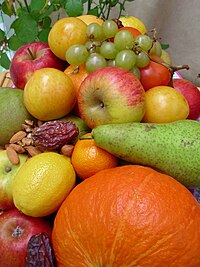**1. Fruitarianism Overview:**
– Varieties of fruitarian diets include those based on fallen plant foods, avoidance of grains, and exclusion of seeds for ethical reasons.
– Diets may consist of raw fruits, nuts, seeds, honey, olive oil, beans, and chocolate.
– Ideological motivations for fruitarianism range from ethical considerations to detoxification and personal challenges.
– Nutritionists caution against long-term fruit-only diets due to risks of malnutrition and deficiencies in calcium, protein, iron, zinc, and vitamins.
**2. Health Concerns and Risks of Fruitarianism:**
– Fruitarian diets are more restrictive than vegan or raw vegan diets, potentially leading to dangerous deficiencies.
– Long-term adherence can result in deficiencies in calcium, protein, iron, zinc, B vitamins, and essential fatty acids.
– High sugar levels in fruits can impact blood sugar levels, and severe restrictions may lead to orthorexia nervosa.
– Growth and development concerns include severe malnutrition, anemia, and lack of essential nutrients, especially in children.
**3. Historical and Cultural Aspects of Fruitarianism:**
– Notable historical figures like Idi Amin and Mohandas Gandhi practiced fruitarianism.
– Fruitarianism originated from refraining from harming living beings and includes only naturally shed plant parts.
– Risks associated with extreme fruitarianism have been documented historically, including cases of malnutrition and negative health outcomes.
– The variability in fruitarian practices and interpretations has evolved over time, with changes in recommendations and guidelines.
**4. Scientific Perspectives and Research on Fruitarianism:**
– Studies have examined the impact of fruitarian diets on health and the prevalence of nutrient deficiencies.
– There is a lack of consensus on the long-term effects of fruitarianism within the scientific community.
– Critiques of fruitarianism from a scientific standpoint highlight concerns about the safety and healthiness of the diet.
– Ongoing debates exist regarding the scientific validity and sustainability of fruitarian diets.
**5. Key Figures and Literature in Fruitarianism and Vegetarianism:**
– Notable figures in fruitarianism include David L. Katz, Michael Klaper, and Susan M. Levin.
– Historical literature on vegetarianism provides insights into the origins and beliefs of plant-based diets.
– Advocates of vegetarianism like Helen Nearing and Howard Williams have contributed to the promotion of plant-based diets.
– Chefs and cookbook authors such as Nava Atlas and Mayim Bialik have popularized vegetarian and vegan culinary practices.
Fruitarianism (/fruːˈtɛəriənɪzəm/) is a diet that consists primarily of consuming fruits and possibly nuts and seeds, but without any animal products. Fruitarian diets are subject to criticism and health concerns.

Fruitarianism may be adopted for different reasons, including ethical, religious, environmental, cultural, economic, and presumed health benefits. A fruitarian diet may increase the risk of nutritional deficiencies, such as reduced intake of vitamin B12, calcium, iron, zinc, omega-3 or protein.
